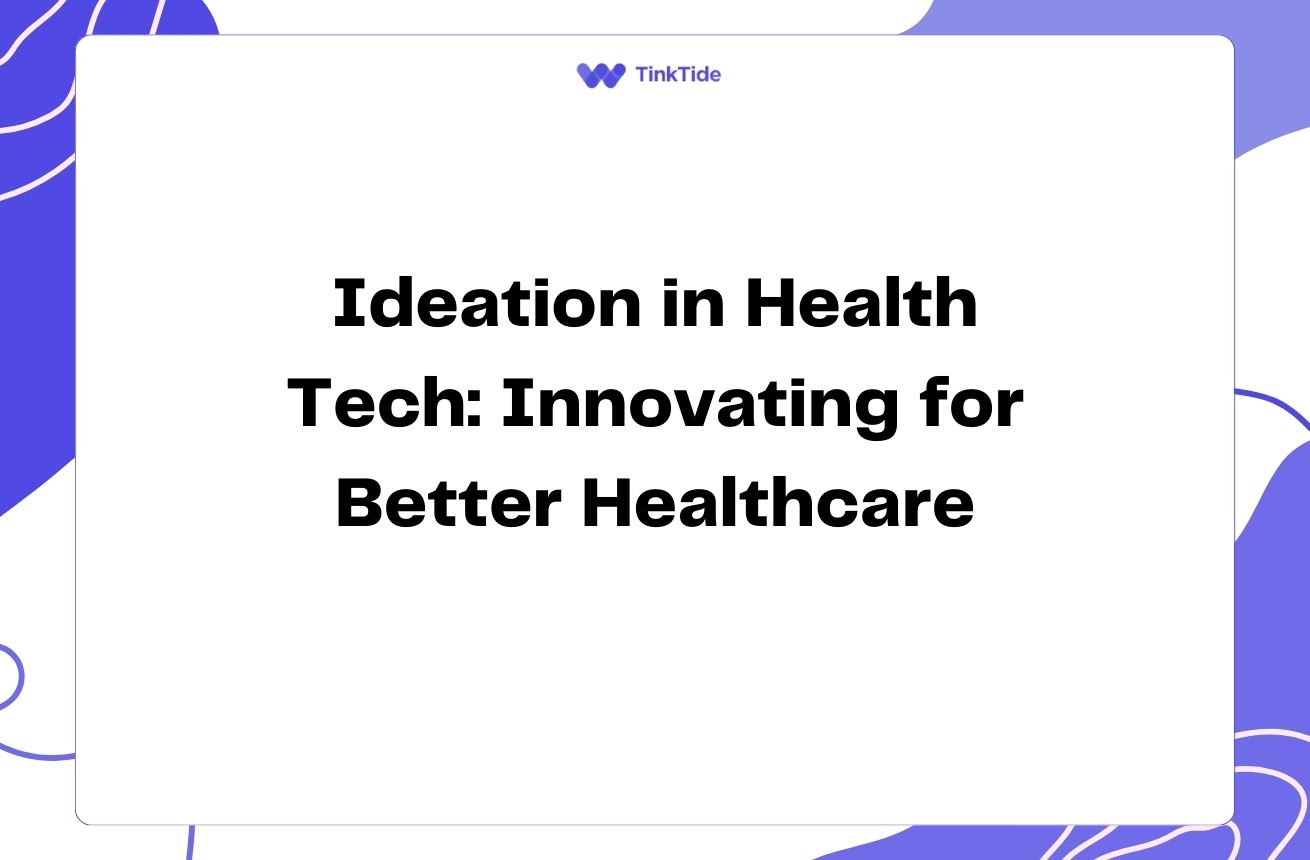The Future of AI in Ideation: Predicting Evolution and Impact
The Current State of AI in Ideation
Artificial Intelligence (AI) has already made significant strides in the realm of ideation, transforming how we approach creative problem-solving and innovation. Today, AI-powered tools like IBM Watson and OpenAI's GPT models are being used to generate ideas, analyze vast amounts of data, and provide insights that fuel the ideation process.
These AI systems are capable of processing and synthesizing information from diverse sources, identifying patterns, and generating novel concepts that human minds might overlook. For instance, in the field of drug discovery, AI algorithms are now capable of suggesting potential drug candidates by analyzing molecular structures and predicting their interactions with target proteins.
However, the current state of AI in ideation is just the tip of the iceberg. As we look towards the future, it's clear that AI will continue to evolve and reshape the landscape of creative thinking and problem-solving across industries.
Key Areas of AI Evolution in Ideation
As we peer into the future of AI-powered ideation, several key areas are poised for significant advancement:
- Enhanced Natural Language Processing (NLP)
- Improved Context Understanding
- Advanced Pattern Recognition
- Emotional Intelligence and Creativity
- Cross-domain Knowledge Integration
Enhanced Natural Language Processing
Future AI systems will boast significantly improved Natural Language Processing capabilities. This advancement will enable AI to better understand and generate human-like text, making it an even more powerful tool for brainstorming and idea generation.
Imagine an AI that can engage in real-time, back-and-forth dialogue with a team during a brainstorming session, offering unique perspectives and challenging assumptions. This level of interaction will push the boundaries of creative thinking and lead to more innovative solutions.
Moreover, enhanced NLP will allow AI to process and analyze vast amounts of unstructured text data from diverse sources like social media, academic papers, and industry reports. This will provide a more comprehensive foundation for ideation, ensuring that generated ideas are grounded in the latest trends and research.
Improved Context Understanding
Future AI systems will demonstrate a deeper understanding of context, allowing them to generate more relevant and nuanced ideas. This improvement will be crucial in fields like marketing and product development, where understanding cultural nuances and consumer behavior is essential.
For example, an AI system with advanced context understanding could analyze global market trends, local cultural preferences, and individual user behavior to suggest highly targeted product ideas or marketing campaigns. This level of contextual awareness will lead to more effective and resonant ideation outcomes.
Furthermore, improved context understanding will enable AI to better interpret ambiguous or abstract prompts, making it a more versatile tool for creative professionals across various disciplines.
Advanced Pattern Recognition
AI's pattern recognition capabilities will continue to evolve, allowing for more sophisticated analysis of complex data sets. This advancement will be particularly impactful in fields like scientific research and financial forecasting.
Future AI systems will be able to identify subtle patterns and correlations that human analysts might miss, leading to groundbreaking discoveries and innovative solutions. For instance, in climate science, AI could uncover previously unnoticed relationships between various environmental factors, sparking new ideas for addressing climate change.
Moreover, advanced pattern recognition will enable AI to generate more creative and unexpected connections between seemingly unrelated concepts, fostering true out-of-the-box thinking in the ideation process.
Emotional Intelligence and Creativity
One of the most exciting developments in AI's evolution will be the incorporation of emotional intelligence and true creativity. While current AI systems can generate ideas based on existing data and patterns, future AI may be able to understand and simulate human emotions, leading to more empathetic and resonant ideation.
This advancement could revolutionize fields like storytelling, advertising, and product design. Imagine an AI that can not only generate plot ideas for a novel but also understand the emotional impact of different narrative choices on readers. Or consider an AI-powered design tool that can create product concepts that evoke specific emotional responses in users.
The integration of emotional intelligence and creativity in AI will blur the lines between human and machine-generated ideas, opening up new possibilities for collaborative ideation between humans and AI.
Cross-domain Knowledge Integration
Future AI systems will excel at integrating knowledge from diverse domains, leading to more holistic and innovative ideation outcomes. This cross-pollination of ideas from different fields will be crucial in solving complex, multifaceted problems.
For example, an AI system might combine insights from biology, materials science, and architecture to generate novel ideas for sustainable building designs. Or it could integrate knowledge from psychology, neuroscience, and computer science to propose innovative approaches to human-computer interaction.
This cross-domain integration will not only lead to more creative ideas but also help break down silos between different fields of study and industry sectors, fostering interdisciplinary innovation.
The Impact on Ideation Processes
As AI continues to evolve in these key areas, it will significantly transform ideation processes across industries. Here's how:
- Accelerated Idea Generation: AI will dramatically speed up the ideation process, allowing teams to generate and evaluate a larger number of ideas in less time.
- Enhanced Collaboration: AI will become an integral part of brainstorming sessions, acting as a creative partner that can challenge assumptions and offer unique perspectives.
- Data-Driven Creativity: The integration of vast amounts of data will lead to more informed and targeted ideation, balancing creativity with practical considerations.
- Personalized Ideation: AI will be able to tailor the ideation process to individual or team preferences, optimizing for different thinking styles and creative approaches.
- Continuous Ideation: With AI, ideation will become a more continuous process, with systems constantly generating and refining ideas based on real-time data and feedback.
Ethical Considerations and Challenges
While the future of AI in ideation is promising, it also raises important ethical considerations and challenges that need to be addressed:
1. Bias and Fairness: As AI becomes more involved in ideation, we must ensure that the ideas generated are free from harmful biases and promote fairness and inclusivity.
2. Intellectual Property: The question of who owns ideas generated by AI will become increasingly complex, requiring new legal frameworks and guidelines.
3. Human Creativity: There's a concern that over-reliance on AI for ideation could stifle human creativity. Striking the right balance between AI assistance and human ingenuity will be crucial.
4. Transparency and Explainability: As AI systems become more advanced, ensuring transparency in how ideas are generated and making the process explainable to humans will be essential for trust and adoption.
Preparing for the Future of AI-Powered Ideation
To harness the full potential of evolving AI in ideation processes, organizations and individuals should:
- Invest in AI literacy and training to ensure teams can effectively collaborate with AI systems
- Develop ethical guidelines for the use of AI in ideation processes
- Foster a culture of human-AI collaboration that values both machine efficiency and human creativity
- Stay informed about the latest developments in AI and their potential applications in ideation
- Experiment with emerging AI tools and platforms to gain hands-on experience and insights
Address common questions
As AI continues to evolve and influence ideation processes, several questions often arise. Let's address some of the most common ones:
Will AI completely replace human creativity in ideation?
No, AI is not likely to completely replace human creativity. Instead, it will augment and enhance human creative capabilities. The future of ideation lies in effective collaboration between humans and AI, combining the unique strengths of both to achieve superior results.
How can small businesses benefit from AI-powered ideation?
Small businesses can leverage AI-powered ideation tools to level the playing field with larger competitors. These tools can help generate innovative ideas, analyze market trends, and optimize product development processes, all at a fraction of the cost of traditional research and development methods.
What skills will be important for working with AI in ideation?
Key skills for working with AI in ideation include critical thinking, data literacy, adaptability, and interdisciplinary knowledge. The ability to effectively prompt and guide AI systems, as well as interpret and refine their outputs, will be crucial.
How will AI impact the speed of innovation?
AI is expected to significantly accelerate the pace of innovation by speeding up idea generation, reducing the time needed for market research, and enabling rapid prototyping and testing of concepts. This could lead to shorter product development cycles and more frequent innovations across industries.
What are the potential downsides of relying on AI for ideation?
Potential downsides include over-reliance on AI leading to a decrease in human creative skills, the risk of generating ideas that lack emotional resonance or cultural sensitivity, and the possibility of AI reinforcing existing biases if not properly designed and monitored.
How can we ensure diversity and inclusion in AI-powered ideation?
Ensuring diversity and inclusion in AI-powered ideation requires diverse teams developing AI systems, using inclusive and representative data sets, and implementing regular bias checks. It's also important to combine AI-generated ideas with diverse human perspectives to ensure a wide range of viewpoints are considered.
Provide additional resources
AI for Creativity and Innovation
A comprehensive course on leveraging AI for creative processes
The Creative AI Lab
Research and resources on the intersection of AI and creativity
AI and the Future of Innovation
Harvard Business Review article on AI's impact on innovation
Ethics in AI-Powered Ideation
World Economic Forum's perspective on ethical considerations in AI innovation
AI Creativity Tools Directory
A curated list of AI tools for creative professionals
Future of AI in Business
McKinsey's insights on the evolving role of AI in business and innovation
Summarize key takeaways
As we've explored, the future of AI in ideation processes is both exciting and transformative. From enhanced natural language processing to emotional intelligence and cross-domain knowledge integration, AI is set to revolutionize how we generate and develop ideas across industries.
The evolution of AI will lead to accelerated innovation, more collaborative ideation processes, and the ability to tackle complex, multifaceted challenges with unprecedented efficiency and creativity. However, this future also comes with important ethical considerations and challenges that must be addressed proactively.
To thrive in this AI-powered future of ideation, individuals and organizations must embrace continuous learning, foster human-AI collaboration, and stay attuned to the latest developments in AI technology. By doing so, we can harness the full potential of AI to drive innovation and solve the world's most pressing problems.
Supercharge Your Ideation Process with AI
Discover how our AI-powered platform can revolutionize your approach to innovation and problem-solving.
Start Your Free Trial
